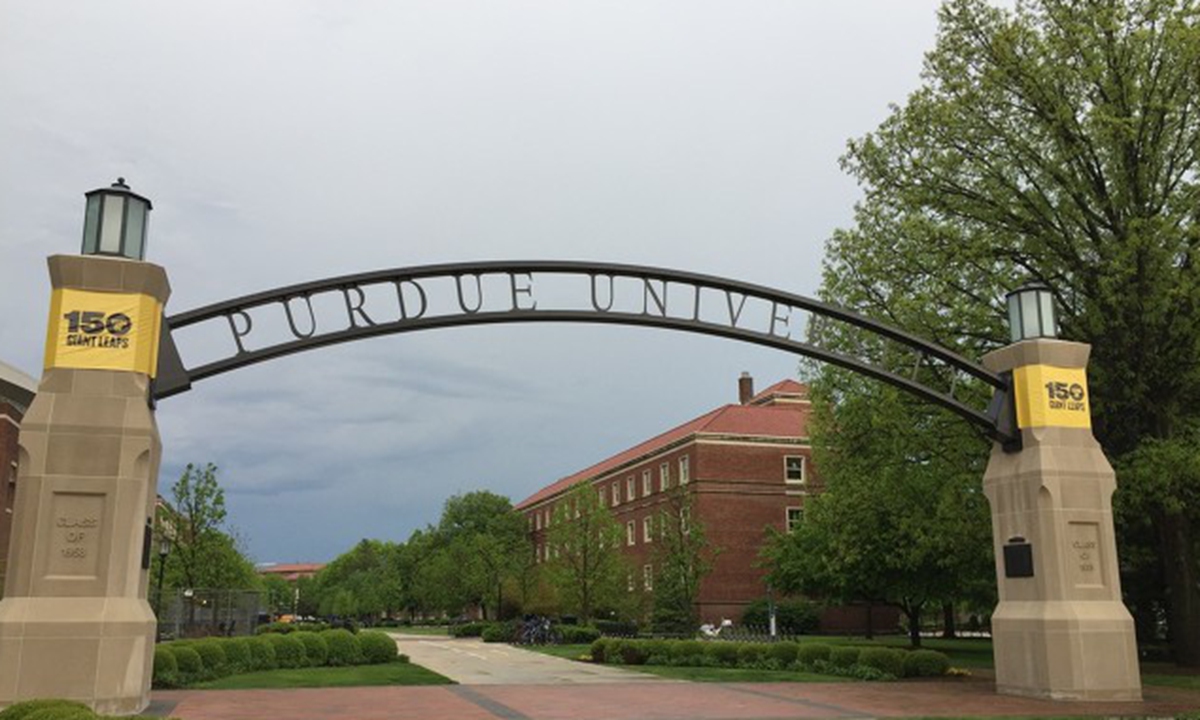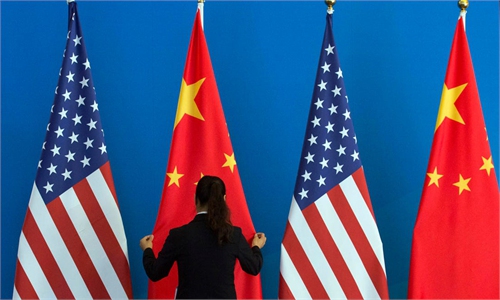IN-DEPTH / IN-DEPTH
GT investigates: Why American institutes stigmatize Chinese students who defend reputation of motherland?
Poisoned well

A view of Purdue University. Photo: VCG
Purdue University President Mitch Daniels' open letter to all students on December 15, in which he condemned Chinese students for "harassment" and "threats" allegedly made against students who criticize China, has caused a huge outcry and backlash on campuses across the US, as Chinese students expressed their indignation toward the lies of anti-China forces in the US, and that those who defend the truth and the dignity of China were mischaracterized as bullies.The controversial incident stemmed from a revelation that Chinese PhD candidate Kong Zhihao at Purdue University made repeated statements attacking his country, including supporting the riots orchestrated by Hong Kong secessionists and arguing that China's Taiwan region is a sovereign state.
"At our school, Chinese students are outraged to hear Kong's slander. Some of our compatriots were seeking legitimate ways to expose his hypocrisy, but not to attack him out of line," Sophia Zhao (pseudonym), a senior undergraduate student majors in communication at Purdue University, told the Global Times.
Zhao said she saw through the incident to the deep malice of the US toward Chinese students. "The Purdue president came to believe, only listend to what the media say, that Kong had been persecuted, and even slapped all Chinese students with a 'collusion with foreign governments in repression' charge,'" she said.
However, the students' peaceful means of correcting Kong's erroneous remarks were deemed "attacks" by the Purdue president.
Liu Pengyu, spokesperson of the Chinese Embassy in the US, said on December 18 that Purdue University's allegations against its Chinese students are unfounded and that such allegations pose a threat to the reputation and safety of the Chinese student community.
Kong, currently has desperately shared his email around in various interviews, waiting for more anti-China activists to extend an olive branch to him.
Experts and observers reached by the Global Times said that Kong's words and actions must have been influenced by the environment where he studied and lived in the US. Currently, the US is seeking every possible way to contain China, with more Chinese students becoming the targets of influence to oppose China, experts said.
"These people are the defective products of American education system. Their being able to 'have an audience' shows a sick social environment in the US," Li Haidong, a professor at the Institute of International Relations at China Foreign Affairs University, told the Global Times.
Open infiltration
"People with ulterior motives are everywhere in the US," Zhao said, noting that on campus, many anti-Chinese clubs have set up China-related topics with ulterior motives to brainwash students and recruit like-minded people.
According to Zhao, these groups usually use sensational pictures and provocative titles to attract curious foreigners and Chinese students.
"The initial meeting may seem professional because they invite one or two scholars for a brief objective discussion. If you are interested in attending their upcoming events, then you may be treated to a series of elaborate anti-China documentaries produced by Western media outlets that will make you question your understanding of China," Zhao noted.
These people are also quick to become "close friends" to those they want to brainwash, pretending to care for their lives while subliminally influencing them with their distorted values, Zhao said. "Then, when it comes to some issues, they will pull you in, in the name of a 'joint advance and retreat' to make a statement or even launch some protests," she said.
A 2017 article titled How Spy Agencies Use American Universities to Secretly Recruit Students revealed that, US intelligence agencies develop sources among international student faculties and send them home as American operatives. In a poll of staff at US universities who work with international students, "31 percent reported the FBI had visited students within the past year," wrote the article authored by US journalist and writer Daniel Golden.
In addition to this infiltration into the ivory tower of American academia, the Global Times found that the US government is even using money to offensively infiltrate the students in China and the US.
In May, for example, the US embassy and consulates in China released its Mission China Public Affairs Section (PAS) Annual Program Statement on its website. The program aims to support individuals, NGOs, think tanks, and academic institutions in China to organize events that "provide a framework for US businesses to share American values, including but not limited to specific corporate social responsibility activities in partnership or within Chinese communities."
With bounties of up to $30,000, areas where exchanges take place include expanding access for persons with disabilities, women's empowerment, LGBTQI rights, and the preservation of minority cultures, which have long been highly politicized topics in the US.

Photo: VCG
At the same time, observers pointed out that Chinese students with relatively special upbringings, identities, or religious beliefs are more likely to be the focus of cultivation by anti-China forces, because these students are more topical for the West.A student from one of China's ethnic minority groups also shared his experience. Once, while on campus at an American university, he came across a high-school classmate from Beijing.
"I know that her family member was involved in some political crimes in China and she was supported by some overseas NGOs with political affiliations, even anti-China backgrounds, to study in the US," the student, who asked for anonymity, said. "It is a 'secret' we [students from the high school] all know."
The information of Chinese students studying overseas is easy for US agencies to attain, as it is filled in the documents provided upon entry into the US. Another Chinese student who studied in California for three years told the Global Times that because of her Christian belief, various small local churches often tried to tempt her into memberships while she was in school, and after inviting her to events, they organized discussions and tried their best to smear China in front of her.
Some of them receive bribes from certain organizations and serve as anti-China tools, Li said, adding that there are also certain people who wish to obtain permission to remain in the US after graduation through smearing their home country, Li said.
Being infiltrated through whatever means, such as cash incentives or emotional blackmail, these students develop a delusion of self-importance, but in actuality, they are under others' control, Li said. "Because usually these people do not have much experience and understanding about the society and their values are relatively easy to shake."
Purposeful deployment
The US' work to influence foreign students with decided political intentions has been a consistent effort that has directly and indirectly led to color revolutions sweeping across Eastern Europe and the Arab world, causing social instability.
According to Russian media reports, the Russian government in 2014 discovered that some American NGOs supporting the Secondary School Student Program were registered as NGOs in Russia with funding from the American Councils for International Education. Russia then designated these organizations as foreign government agents and terminated the program.
Since 1992, about 22,000 Russian students have participated in the program. None of them remained in the US, but returned to Russia. Some became prominent journalists, university lecturers, opinion leaders, and members of "human rights" and environmental groups.
American values and its way of life are imprinted on these people's minds, and as a result, they often actively promote their experiences from the US. In this way, the US effectively creates an "alternative elite" in other countries, analysts said.
In Egypt, even though some NGOs look legitimate, whenever the country experiences turmoil, they take advantage of the situation to stir up trouble.
A leader of Egypt's April 6 Youth Movement, an anti-government activist, was invited to New York for the International Coordination Meeting of Youth Organizations in 2008, where he admitted later in a documentary that he had undergone an "internship" and was familiar with how to cope with police violence.
And countries such as Georgia, Ukraine and Kyrgyzstan have showed that some of the young people, after having studied in and being influenced by the US, became the detonators of color revolutions in their countries, Li said.

Ukrainian anti-government protesters burn tires at a site of clashes with riot police in Kiev on January 25, 2014.Photo:VCG
Many historical records show that the US' actions to politically infiltrate other countries and thereby plunge them into chaos are not uncommon but are very purposeful and systematic, Wang said. "US capitalism is inseparable from its large intelligence support web. The US is a veteran in the area of peaceful evolution. With a quick glance, they can identify the right targets and focus on cultivating and consciously guiding them.""The penetration process is covert and slow. When these young people realize that they are being used and are on the wrong path, it would have already caused irretrievable damage," Li said.
Shameful US double standards
While the US itself has openly made transformed NGOs and other organizations into tools and platforms for exporting US value, and staging of color revolutions, it is also obsessed with stigmatizing normal academic and humanistic exchanges on the Chinese side as infiltration, interference, and even espionage.
In recent years, the US has made a habit of suppressing Chinese students for no legitimate reason, with 3,000 to 5,000 Chinese students being denied visas to the US each year for their under and graduate learning, accounting for 16 to 27 percent of the total, according to the Chinese Foreign Ministry. Even Chinese students who are granted visas are often overly scrutinized by customs, and have their electronic devices confiscated or even themselves deported.
Zhao pointed out that in the US, Chinese students are the best-behaved, most hardworking, and united students. "We are incredibly disciplined on campus. Although we sometimes seem to be a little bit tightly-nit, we rarely do anything particularly out of the ordinary."
As for the alleged bullying, "a proper response to rumors and slander is a decision most Chinese people will have to make. We love our motherland," Zhao responded.
The act of defending the motherland is not an act of suppression of other students. It is a matter of right or wrong. "This is very important, especially at a time of ongoing strategic battles between China and the US," he said. "It is also key that US conspiracies are not carried out in China," Wang said.
Zhao advocated that we should also give more care and support to the Chinese student community overseas, as "this will help them to be more confident and stable during their more susceptible stages in life."

